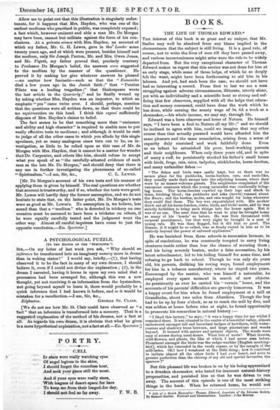A PSYCHOLOGICAL PUZZLE.
[To THE EDITOR OF THE SPECTATOR-1
Si,—On my letter of last week you ask, "Why should an inference be transformed into an imaginary memory more in dream than in waking states?" I would say, briefly,—(1), that having observed it to be the fact in many of my own dreams, I should believe it, even if I could not divine the explanation ; (2), in the -dream I narrated, having it borne in upon my own mind that a procession had been arranged for, although this was a new thought, yet not receiving it as information from the bystanders, not going beyond myself to learn it, there would probably be a -quick inference that I had known it before, and so it would be mistaken for a recollection.—I am, Sir, &c.,
[We do not see how Mr. St. Clair could have observed as "a fact" that an inference is transformed into a memory. That is a suggested explanation of the method of his dreams, not a fact at all. As regards his own dream, it is obvious that what he gives is a mere hypothetical explanation, not a fact at all.—En. Spectator.]


































 Previous page
Previous page